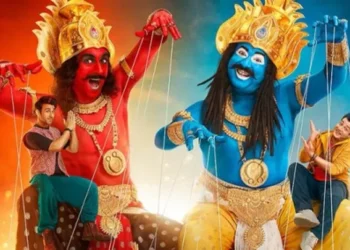The Running Man returns to the screen with Edgar Wright at the helm and Glen Powell stepping into the spotlight. Adapted from Stephen King’s 1982 novel, this latest iteration transforms the dystopian text into a sharp, modern commentary on media manipulation, corporate dominance, and societal decay. Wright’s vision trades in flashy spectacle for a grittier look at a future that feels uncomfortably like the present.
Story
Set in a near‑future America of 2025, Wright’s The Running Man unfolds in a society where corporate conglomerates rule the media, and extreme reality shows capture the nation’s attention. The deadliest of them all, “The Running Man,” forces those labeled as social burdens into a brutal survival contest, hunted by elite pursuers known as the Hunters.
Powell portrays Ben Richards, an out‑of‑work laborer struggling to keep his family afloat. With his infant daughter in urgent need of medicine he cannot afford, Ben reluctantly agrees to participate in the deadly game, lured in by promises from Dan Killian (Josh Brolin) – the program’s manipulative producer. What follows is a tense journey across a crumbling America, as Ben faces relentless danger, moral compromise, and fleeting alliances.
Performances
Glen Powell delivers a grounded, emotionally charged performance that makes Ben relatable without turning him into a stereotypical action hero. His quiet moments carry weight, and his physicality sells the high‑stakes survival.
Josh Brolin brings a charismatic menace to Killian, embodying a man who sees himself as both creator and destroyer. Colman Domingo stands out as the show’s flamboyant host, injecting stylish arrogance into every scene. Supporting players, however, feel underutilized, with brief appearances by William H. Macy and Emilia Jones adding little narrative depth, despite their potential.
Behind the Scenes
With a reported budget of $110 million, this is Wright’s most ambitious project to date. The director’s trademark tight editing, playful needle‑drops, and tonal shifts make appearances, though they’re more restrained here compared to his earlier work (Hot Fuzz, Scott Pilgrim).
The film’s strongest sequences include an intense hotel ambush showcasing Ben’s ingenuity and a chaotic subplot featuring Michael Cera reminiscent of Home Alone mayhem – a welcome burst of Wright’s signature humor amid the darkness.
Visually, the dystopia avoids the neon‑lit escapism of Blade Runner, instead leaning into a grim plausibility. Self‑driving cars, tabloid‑style reality shows, and morally numb audiences create an unsettlingly familiar atmosphere, blurring the line between speculative fiction and real‑world news.
Final Verdict
Edgar Wright’s The Running Man is a gripping, politically aware thriller that trades fantasy for a disturbingly realistic future. Glen Powell commands the screen, and the central survival narrative delivers excitement even when the storytelling wavers.
While the ending opts for a safer conclusion than King’s more uncompromising finale, the film still lands as a potent commentary on how entertainment, capitalism, and media manipulation intersect. It’s Wright’s most mainstream work, but it maintains enough bite to keep audiences engaged – even if it stops short of being a genre‑defining masterpiece.
https://snooper-scope.in/glen-powells-the-running-man-trailer-released-amidst-high-expectations/























